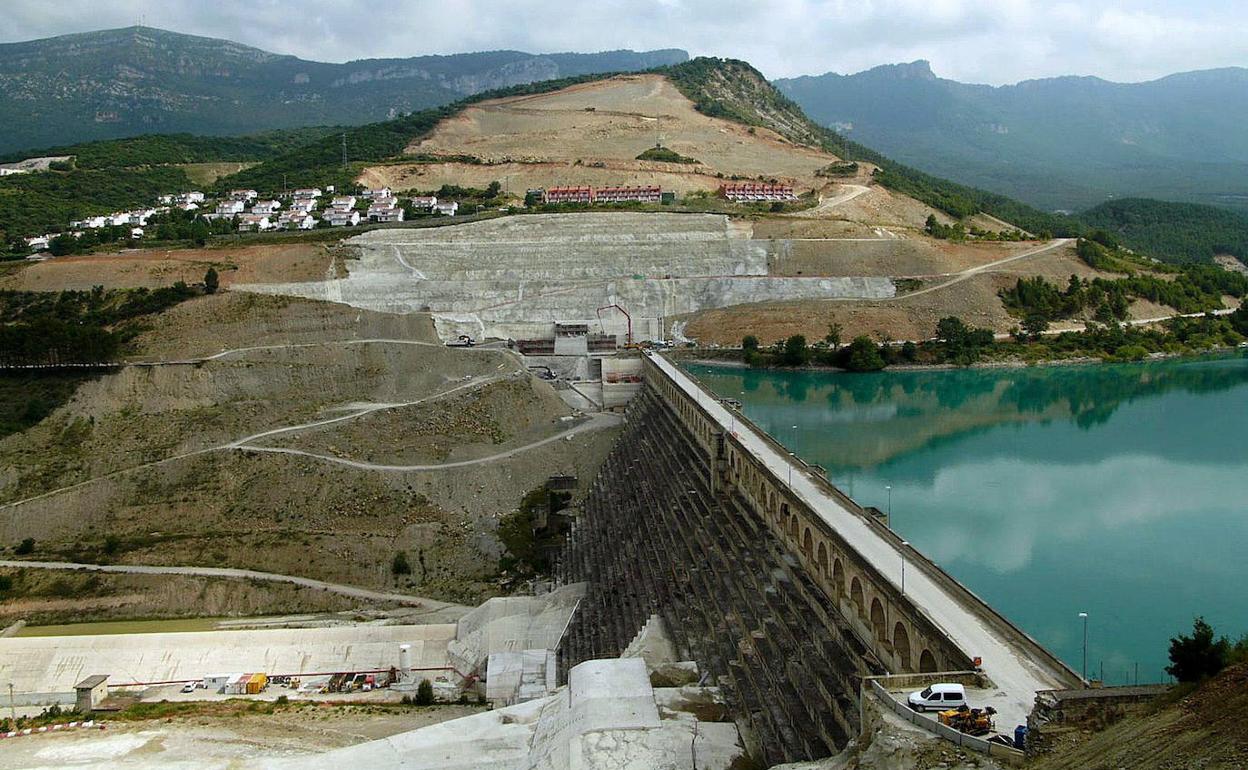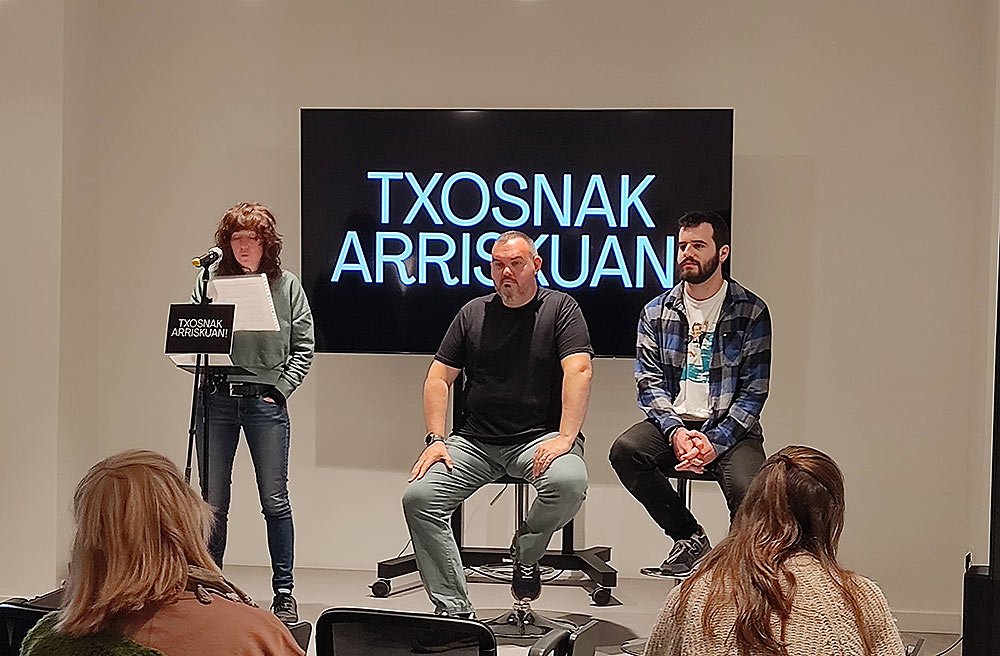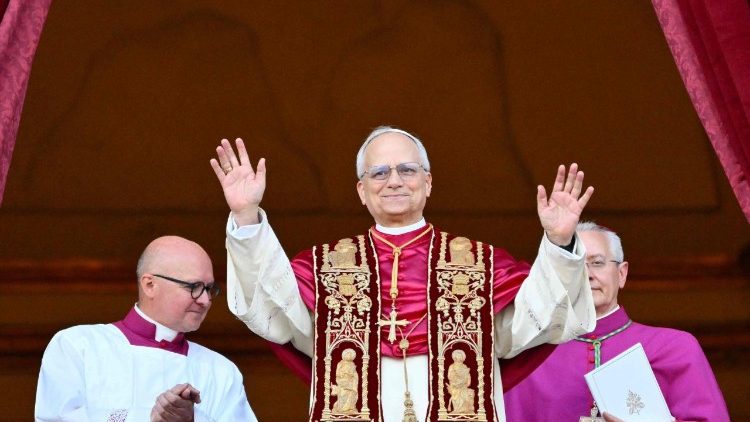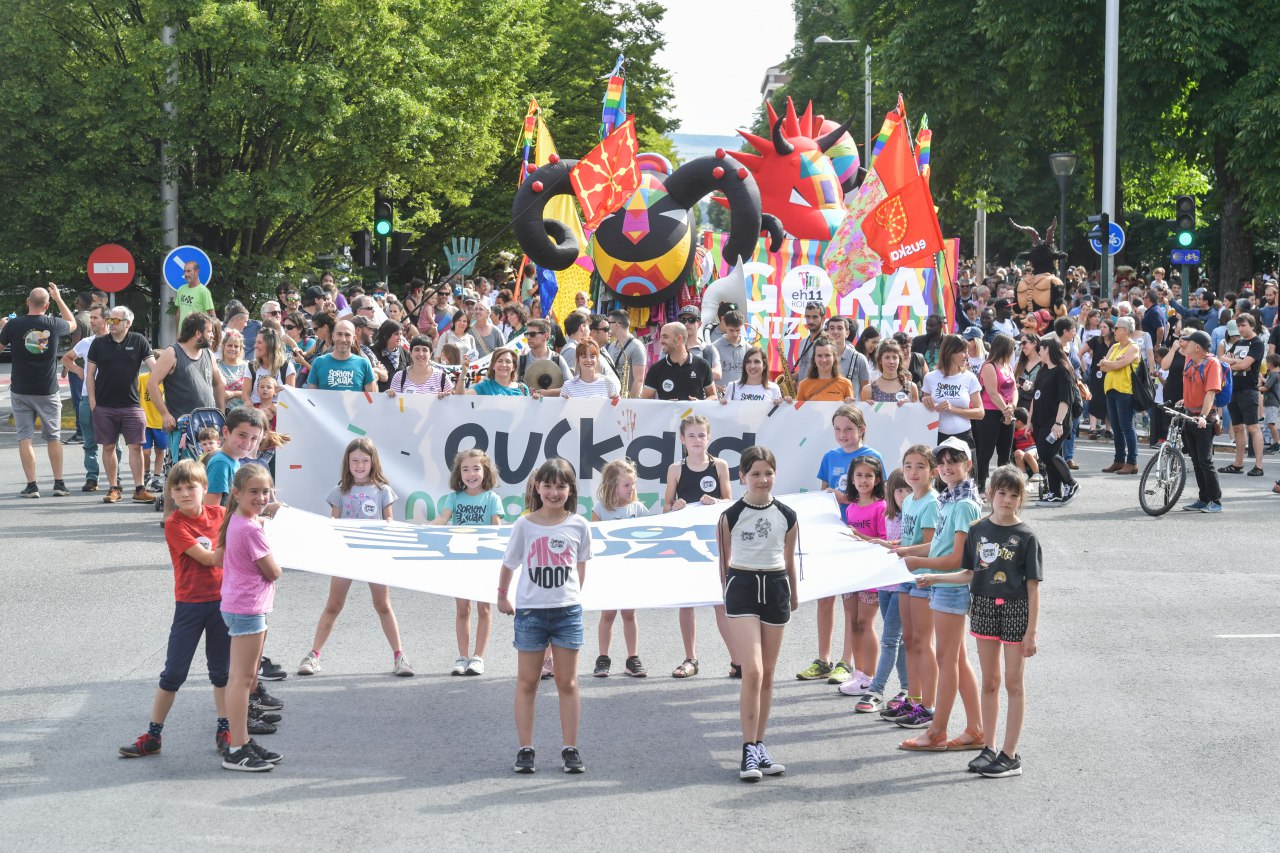"I wanted to teach at the ikastola, teach in Basque, work in the Basque world"
- On December 4, 1963, a group of children climbed the stairs of number 9 on Cercas de Vitoria Street, with their parents’ hands. On the fourth floor, on the left door, Miss Izaskun Arrue waited for them. First ikastola of Vitoria-Gasteiz. On that day Itziar started climbing the stairs…

In 1963, he was 6 years old. Do you have any memory of that first day of Ikastola?
I didn't have any clear memory, but I guess I would be there. For the rest, a lot of memories! After all, that was my childhood. I remember very well that I went with my father and my mother to see that house on Cercas Street. Because I had already started school, Florida school, in our neighborhood. There I spent the two or three months before returning home in Izaskun [Arrue]. I remember we went to meet Izaskun and to see the site. “This will be your new school,” they told me, “and this is your young lady.” I remember these words. I saw an empty room. Izaskun, for his part, seemed like a nice person. Within two days, or a week, I started going to that school. At first we were very few. I have a picture of that time, and there we are Rafa, son of Izaskun, Arantza Aranzabal, Iñaki Arriola, Jabi Ugarte, Pedro Elosegi, another Arantza who spent little time there, Idoia Yoldi, some other and me. It was the beginning. Then new children arrived and some of the existing ones had stopped going.
What was the teaching, pedagogy, didactics, methodology?
Izaskun told us: “Sit down, sit on the ground like an Indian!” And there, sitting on the floor, we gave the class. It's a nice memory. To learn how to read and write, we had Martin Txilibitu's booklet. Very nice! Instead of writing there, Izaskun told us to take the chopsticks, they were colored chopsticks, with which we made letters on the ground. “Now we will do A... Now T... Now, M…”. First, we learned to read letters. Then, the words. Then we started reading in the booklet. With the numbers, the same thing. We also had slates and we wrote there. “We copy on the board what we have put on the earth.” The math numbers were compounded by manipulating the barbarians, the beans and the buttons. Or we played the cards, the broom, and in the cards we worked the sums! To elaborate the dictionary, Izaskun already had a kind of lotus. Some images and other words. One spoke out, read, and the others “sang” the image: “Me, me!”…
You yourself are a professor today.
Yes, I have been in teaching for a long time, and it seems to me to be a progressive system, which Izaskun used with us. Nothing traditional. In the nuns, the students would do a lot of calligraphy. We didn't, we learned naturally. I remember we couldn't get down to the street. That was clandestine. At eleven o'clock in the morning, I couldn't leave a gang of children! In return, we laid bed, played or played cards or anything else.
Did you know Basque at that time?
Ehea, nobody knew it in our house! My parents were from Vitoria, López de Lacalle Añarbe. On the part of our mother, grandfather was tolosarra, who came to live very young in Araia. My father, my uncle and others, began learning Basque with Andoni Urrestarazu “Umandi”. They gave some lessons, but not for a long time, because Umandi went into exile. I still have at home his grammar, very old. Parents were nationalists, and that was the bet they made. We played with friends and when they asked us what we should say with those we are: “What school are you going to?” they say. We say: “To a small school.” “What do you learn?” “for the Basque Country.” “And the Basque for what?” amazed. That is why I say that I think they were brave enough to send us to the ikastola at that time, at that Gasteiz. I spent five years in that house on Zerkabar Street, and at 10 in high school, I became Bachiller first. My sister started in Zerkabarren and then went to the ikastola of Estibaliz. The two younger brothers, for their part, will depart from Stibaliz Avenue to the ikastola Olabide. I went from Cercas Street to high school.
They took you home from Izaskun Arrue because your parents were Basque, to school in Basque.
I guess that was his wish. Besides, they did not have Euskera, and that is what they wanted to give their children! On the other hand, here was a school, a school of apprentices, and there they contacted María Teresa Urrestarazu, Ramón Narbaiza and company. It seems that that apprenticeship school is today a school in the diocese to learn the trade. They were young, about sixteen years old. “On weekends we went to the mountain, we also learned some songs…”, my father said. I believe that in this environment there was the firing of their nationalism, which the priest Ramón Narbaiza was going to convey to them. There were also photos in our house. “Here we are at the top of the Gorbea,” our father told us. And it was the gang of that apprenticeship school. I believe that through that cure we began to learn Basque at the house of Andoni Urrestarazu.
He talked to us before Martin Txilibitu, a book he used to learn how to read in Basque.
We learned to read, but Izaskun was worried. “These boys and girls, then they have to go to high school. They also have to learn topics in Spanish.” And we bought the Encyclopedia, the famous book that all the students used at the time. “You have to learn by heart for tomorrow,” Izaskun promised us. She took care of the housework. The next day we had to go home, study in Spanish and explain to Izaskun in Basque. It was a double job, but at the same time we learned both of them, OK! Izaskun also told stories and, to my liking, afternoons were wonderful. We sang! He had a booklet with the lyrics and notes of the songs. We played the melody, we sang and we sang. I really liked singing, and we spent part of the afternoon on that. They were always popular songs. The sea is cloudy, I live sad, Silently… There I learned all the popular songs I have learned.
There was a Christian lesson there...
Yes, we also had to give the doctrine, we had to go to catechesis in Vitoria, and at the house of Izaskun we learned to pray in Basque. In the catechesis of the outside it was all in Spanish, but perhaps Izaskun himself taught us some little squares in Spanish about the doctrine. On Friday afternoon, I was making a little contest. He would put us in a small circle, ask us questions and give a small coin to which he would answer everything correctly. I do not know whether it will have been two reais, but I am very glad that the coin was taken home on Friday. I remember very nice things. We were all a family. Few children and all friends. We didn't have a patio, but sometimes we all jumped together at the exit -- when all the boys and girls were on the street, when there was no danger of getting our attention -- and we played in a kind of hallway under Izaskun's house. That is where we got off!
I guess there were after-school activities ...
Yes. I remember, about nine years, they organized some colonies and we went to Lekaroz, in a small group. I, the truth, remember the ones I always had: Aranzabal, Arriola, Elosegi and Rafa Pikatoste. I don't know if we were there for a week or fifteen days. Our first camp! Session to not lose or strengthen the Basque Country. A lot of things were organized… We were also in Eibar, in Arrate, in a competition, the usual five. They were language-related games. It was a comic book, but it didn't have words, and we had to put words to it. Or it was the end of a story -- I think it was exercises to measure our language level.
Many years later, Peli Martin would also write about Arrate. That your parents had fun and that they were happy.
Yes, I think we got a good job. I remember we went in a car and we got the magazines. I think it was Kili-kili. That was once... In winter, we learned Christmas songs, we went to Brigid church and one day, in the afternoon, we sang. I don't know if we were singing for our parents, if we were coming from the outside to hear us. But we did go to church and we sang. Communion, on the other hand, I did it in the church of the neighborhood in Spanish, and while we prepared it, the priest asked us in Spanish, but I only knew Euskera!
And then?
So? Once the priest asked me a question of catechism. I did not know how to answer in Spanish, but in Basque: “I know how to respond, but in another language.” “Ah, yes?” the priest, “and in what language?” “Euskaraz,” I say. “Well, say.” And I said, starting and ending. I don't know if it was Sinisten, or what, but at least I said it all. And all the kids would look at me. And I, embarrassing! “But where are you from? Are you Basque?”, “Yes, but from Vitoria, like you!”, I, shy. It also happened to me in high school, when I went out on the board and there, multiplications or divisions. But I was trained in Basque! I was doing operations in Basque within me, and then I was translating my words into Spanish. “Three four, twelve,” I knew, but then I had to learn to say, “three by four, twelve.” How many things like that! At first it was a bit hard… I did the communion in Spanish, but Pedro, Iñaki and a Mendizabal followed me, for example, they were able to speak in Basque in Brigida. I have the 1967 photo...
So, he also excelled at the institute.
I tried to go through in disguise. Many of his professors belonged to the Franco regime. It was better to keep your mouth closed. I wouldn't say I was afraid, but I knew I couldn't tell some things about the ikastola, which my parents told her at home. It was not convenient to tell him. Even though I was on my turn, I was initially uphill. I was alone. Pedro and Iñaki went together, they were next to each other. Just me. And Arantza also left alone. In high school, on the one hand we were the girls and on the other we were the boys. They were two institutes. In our room we were 42 girls, and I, until then, was used to the little room and a dozen people. And above all, I always had a reference person: Izaskun, my second mother! At the institute, on the other hand, each subject had its own professor, and the treatment was a miss.
As we know, you left the institute and headed to the ikastola of Stibaliz Avenue, where you had to keep the Basque and do the duties. Apparently, you had the help of Maria Jesús Arriola and Rafa Etxegarai…
Yes, the parents were worried about whether we were going to lose Euskera. In our houses we did not speak in Basque, we did not speak in Basque. In Izaskun's house he spoke in Basque, went out to the street and spoke in Spanish. I guess so. Anyway, as I said, I went directly from the house of Izaskun to the institute, without going through the ikastola of Avenida Alentbaliz. From time to time I went to the holiday school and the days that were still at the ikastola. In addition, my brothers were also there. Yeah, he also walked around. “Come to Itziar, stand by her and help us read.” Even when we went out into the yard, we played with the little ones, or we took care of them. Since then, I liked teaching. When I was little, when I left Izaskun and went home, I took dolls, I put myself on the floor and I played, because those dolls were children and I was Izaskun.
You wanted to be a teacher, from a young age.
I had no doubt. I wanted to be a professor at a ikastola. I studied teaching and in 1979 I started looking for work. At that time, the way of working was to make oppositions, but if you did oppositions, you had to go to school in Spanish! I did not want to work in any centre, I wanted to do it in the ikastola, I wanted to teach it in Euskera, I wanted to work in the Basque world. And fortunately, that same summer, I got a call to work at the Ikasbidea ikastola in Durana, where I made 33 years. I came to Salburua College in 2013-14.
Itziar Lopez de Lacalle Añarbe (Gasteiz, 1959), Gasteizko lehen ikastola hartara, Izaskun Arrue andereñoaren etxean hasi zen haurretan zaharrena. Arantza Aranzabal, Iñaki Arriola, Pedro Elosegi, Rafael Pikatoste… izan zituen kide, Olabide Ikastolaren hazia erein zuten gelatxoan. Irakasle ikasketak egin zituen Gasteizen: 1979ko ekainean bukatu eta Duranako Ikastola ireki berrian zen irailean, lanean. 33 urte egin zituen han, Haur Hezkuntzan eta Lehen Hezkuntzan. Salburuako Lehen Hezkuntza Ikastetxean ari da iaztik, gustura. Mordoxka ditu garai bateko bizipenak, eta ezpainetan irribarrea duela kontatu ohi ditu duela 50 urteko gorabeherak. Inondik ere, ez zen sasoi txarra izan.
"Beharbada, presio handia izango zuen Izaskunek, une jakin batean gaztelaniazko eskolara joan behar genuelako, eta, hara sartu ahal izateko, azterketa bat gainditu behar genuelako. Baina nik, ume nintzenez, lasai bizi nuen hura, nahiz eta ni lotsatia izan eta berak galderak egiten zizkigunean ni larritu. Gurea lagun giroko eskola zen, ez zen ohikoa. Zenbat aldiz gelditu ote ginen Izaskunen etxean bertan bazkaltzen".
"Orduan Izaskunen etxean beste inon ezin nezake euskaraz hitz egin. Kito. Institutuan hasi nintzenean, berdin, gaztelaniaz ziren harreman guztiak. Gero, irakasle eskolan, euskararen gogoa pizten hasi zen. Izaskunek berak Euskara irakatsi zuen -hautazko ikasgaia zen-, aldi batez 1978 inguruan. Pare bat aldiz joan nintzen haren saioetara, eta ikasleek betikoa: 'Hara gasteiztarra' Eta nola hitz egiten duzu euskaraz?". Piztia arraroa nintzen. Gero, pixkanaka-pixkanaka euskara leku askotara sartu zen. Gaur egun, ia-ia leku guztietan dago. Alde oso handia da".
“Kale honetara etorri eta iruditzen zait berriro igoko naizela, eskaileretan gora, txirrina joko dudala eta Izaskunek irekiko didala atea. Gelatxora sartu, lurrean jarri eta laster hasiko garela kantari… Ondoren, Xabiertxo irakurri eta halakoak egingo ditugula”.
“Batez ere, aitaren nahia zen guk euskaraz ikastea. Gazterik hil zen, ordea, nik zortzi urte nituela, eta, orduan, amak
itsu-itsuan jarraitu zion aitaren nahiari. Gurasoek ez zekiten euskararik, baina horixe nahi zuten guretzat. Uste dut ilusio handia izango zutela guk euskaraz ikasi genuela ikustea”.
Andrea Velasko dietista eta nutrizionistak elikaduraren bidez menopausiak eragindako aldaketak kudeatzeko zenbait gako eman ditu.
BRN + Auzoko eta Sain mendi + Odei + Monsieur le crepe eta Muxker
Zer: Uzta jaia.
Noiz: maiatzaren 2an.
Non: Bilborock aretoan.
---------------------------------------------------------
Ereindako haziek ura, argia eta denbora behar dute ernaltzeko. Naturak berezko ditu... [+]
Antonio Turiel fisikari eta CSICeko ikerlariak aspaldiko urteetan ez bezala bete zuen Hernaniko Florida auzoko San Jose Langilearen eliza asteazkenean. Zientoka lagun elkartu ziren Urumeako Mendiak Bizirik taldeak antolatuta Trantsizio energetikoaren mugak izeneko bere hitzaldia... [+]























